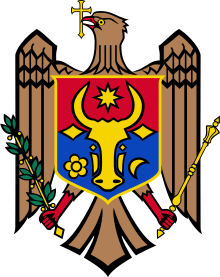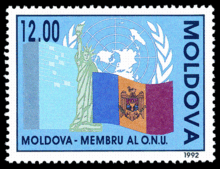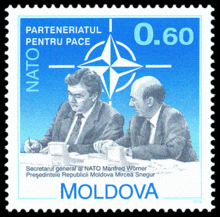Foreign relations of Moldova
 |
| This article is part of a series on the politics and government of Moldova |
|
Judiciary |
|
Executive
|
| Administrative divisions |
|
Foreign policy |
After achieving independence from the Soviet Union, Moldova established relations with other European countries. A course for European Union integration and neutrality define the country's foreign policy guidelines.
In 1995, the country became the first post-Soviet state admitted to the Council of Europe. In addition to its participation in NATO's Partnership for Peace program, Moldova is a member state of the United Nations, the Organization for Security and Co-operation in Europe (OSCE), the North Atlantic Cooperation Council, the World Trade Organization, the International Monetary Fund, the World Bank, the Francophonie and the European Bank for Reconstruction and Development.
In 2005, Moldova and EU established an action plan that sought to improve the collaboration between the two neighboring structures. After the War of Transnistria, Moldova sought a peaceful resolution to the conflict in the Transnistria region by working with Romania, Ukraine, and Russia, calling for international mediation, and cooperating with the OSCE and UN fact-finding and observer missions.
Overview

Moldova has established diplomatic relations with 97 states,[1] the Holy See,[1] the Sovereign Military Order of Malta,[1] and the European Union.[1]
Moldova has not yet established diplomatic relations with:
- Antigua and Barbuda, Bahamas, Barbados, Belize, Dominica, Dominican Republic, Grenada, Guyana, Jamaica, Haiti, St.Kitts and Nevis, St.Lucia, St.Vincent and the Grenadines, Suriname, Trinidad and Tobago
- Chile, Colombia, Costa Rica, El Salvador, Guatemala, Honduras, Nicaragua, Paraguay, Uruguay
- Andorra, Liechtenstein, Luxembourg, Monaco, San Marino
- Benin, Botswana, Burkina Faso, Burundi, Cameroon, Cape Verde, Central African Republic, Chad, Comoros, Côte d'Ivoire, DRCongo, Djibouti, Equatorial Guinea, Eritrea, Ethiopia, Gabon, Gambia, Guinea-Bissau, Kenya, Lesotho, Liberia, Malawi, Mali, Mauritania, Mauritius, Mozambique, Namibia, Niger, Nigeria, Republic of Congo, Rwanda, São Tomé and Príncipe, Senegal, Seychelles, Somalia, South Sudan, Swaziland, Tanzania, Togo
- Bahrain, Bangladesh, Bhutan, Brunei, Cambodia, Iraq, Laos, Maldives, Myanmar, Nepal, Singapore, Tajikistan, Turkmenistan
- Cook Islands, Fiji, Kiribati, Marshall Islands, Micronesia, Nauru, New Zealand, Niue, Papua New Guinea, Timor-Leste, Palau, Samoa, Solomon Islands, Tonga, Tuvalu, Vanuatu
- The states with limited recognition.
Relations with the European Union
Moldova aspires to join the European Union[2] and is implementing its first three-year Action Plan within the framework of the European Neighbourhood Policy (ENP) of the EU.[3]
As regards energy policy, Moldova was an observer to the treaty establishing Energy Community from the outset (2006). Following its interest in full membership, the European Commission was mandated to carry out negotiations with Moldova in 2007. In December 2009, the Energy Community Ministerial Council decided on the accession, but made it conditional to amendment of Moldova's gas law.[4] Moldova joined the Energy Community as a full-fledged member in March 2010.[5]
Relations with NATO
NATO relations with Moldova date back to 1992, when the country joined the North Atlantic Cooperation Council. Moldova works alongside NATO allies and partner countries in a wide range of areas through the Partnership for Peace and the Euro-Atlantic Partnership Council.
Relations with USA
U.S. Secretary of State John Kerry made a visit to Moldova in December 2013 to support the former Soviet republic's pro-Western moves in the face of Russian pressure.
The United States remains committed to the 5+2 negotiations process as a means to resolving the Transnistria conflict. The United States supports a comprehensive settlement that affirms Moldova’s sovereignty and territorial integrity, while providing a special status for Transnistria.
Relations with Romania
Moldova's relations with its western neighbour, Romania, have been stressed since 1994. today's Moldova (without Transnistria) and parts of the old Bassarabia Governorate currently in Ukraine, were part of Romania during the interwar period (1918–40). Linguists generally agree that the Moldovan language is in fact identical with Romanian. However, Moldovans have been ambivalent about whether they consider themselves Romanians or Moldovans. Early signs that Romania and Moldova might unite after both countries achieved emancipation from communist rule quickly faded. Romania remains interested in Moldovan affairs, especially that country's civil conflict with the breakaway republic of Transnistria. However, the two countries have been unable to reach agreement on a basic bilateral treaty; Romania is insistent (against determined Moldovan resistance) that such a treaty would have to refer to Romania and Moldova's 'special relationship'. Beginning in 1994, the two countries enjoyed a visa-free arrangement that ended on January 1, 2007, with Romania's entry into the European Union. This prompted many Moldovan citizens to apply for Romanian citizenship.[6]
Relations with Russia and other post-Soviet states
The Moldovan Parliament approved the country's membership in the Commonwealth of Independent States and the CIS charter on economic union in April 1994. Moldova however has never participated in any military aspects of CIS, citing its neutrality status.
In 1998, Moldova contributed to the founding of GUAM, a regional cooperation agreement made up of Georgia, Ukraine, Azerbaijan and Moldova. Although the agreement initially included a declaration of mutual defense, Moldova has since declared its disinterest in participating in any GUAM-based mutual defense initiative.
Russia continues to maintain a military presence in the Transnistrian region of Moldova, despite previous agreements with Moldova and within OSCE and CAF to withdraw its troops and ammunition.
Relations with South Korea
The establishment of diplomatic relations between the South Korea and Moldova began on 31 January 1992.[7]
Separatist movements
The territory of Moldova includes the separatist Transnistria region. Transnistria had a particularly large non-Moldovan population (about 60%) and broke away from Moldova less than a year after Moldova became independent at the fall of the Soviet Union. It has its own de facto government and acts independently from Chișinău since the War of Transnistria. The international diplomatic situation with respect to the question of Transnistria determines and is determined by Moldova's relations with Russia. Russia, Ukraine, Organization for Security and Co-operation in Europe, EU, and United States are involved at different degrees in the conflict resolution.
Bilateral relationships
Moldova has embassy-level relationships with:
- Austria, Belarus, Belgium, Bulgaria, France, Germany, Greece, Hungary, Italy, Turkey, Latvia, the Netherlands, Poland, Portugal, Romania, Sweden, Ukraine, and the United Kingdom in Europe (excl. Russia)
- Azerbaijan,[8] China, Israel, Russia, South Korea, Turkey and the United States outside Europe.
- Representation Delegation of the European Union, the United Nations (in Geneva and New York City), the Council of Europe (Strasbourg), and the OSCE (Vienna).
| Country | Formal relations began | Notes |
|---|---|---|
| |
| |
| | 1992-03-25 | see Austria–Moldova relations |
| | see Belarus–Moldova relations
There is no common border between Moldova and Belarus. The number of Belarusians in Moldova and of Moldovans in Belarus is insignificant. | |
| |
| |
| | 1992-02-05 |
|
| | 1992-07-28 |
|
| | 1992-02-12 | |
| | ||
| | 1992-01-20 | See Denmark–Moldova relations |
| | 1992-11-10 |
|
| | 1992-02-26 |
|
| |
| |
| | 1992-06-25 |
|
| | see Germany–Moldova relations
Germany has an embassy in Chișinău. Moldova has an embassy in Berlin. | |
| | 27 March 1992 | see Greece–Moldova relations
|
| | ||
| | 1992 |
|
| | 1992-06-22 | see Israel–Moldova relations |
| |
| |
| | 1992-03-16 | see Foreign relations of Japan |
| | ||
| | 2013-09-06 | |
| | 1992-1-30[17] | See Foreign relations of North Korea |
| |
| |
| | 1992-01-14
| |
| | ||
| | See Moldovan–Romanian relations
| |
| | see Moldova–Russia relations
Relations between Moldova and Russia deteriorated in November 2003 over a Russian proposal for the solution of the Transnistrian conflict, which Moldovan authorities refused to accept. In the following election, held in 2005, the Communist party made a formal 180 degree turn and was re-elected on a pro-Western platform, with Voronin being re-elected to a second term as president. | |
| | 1995 |
|
| | 1993-10-27 |
|
| | 1992-01-31 | See Moldova–South Korea relations
|
| |
| |
| | ||
| | 1991-12-25 | see Moldova – United States relations
The United States recognized the independence of Moldova on December 25, 1991, and opened an embassy in its capital, Chișinău, in March 1992. A trade agreement providing reciprocal most-favored-nation tariff treatment became effective in July 1992. An Overseas Private Investment Corporation agreement, which encourages U.S. private investment by providing direct loans and loan guarantees, was signed in June 1992. A bilateral investment treaty was signed in April 1993. A generalized system of preferences status was granted in August 1995, and some Eximbank coverage became available in November 1995. |
See also
Gallery
-

Flag of Moldova on the background of UNO’s emblem and the Statue of Liberty.
-

Flag of Moldova on the background of CSCE seat.
References
- 1 2 3 4 "Error 403". Retrieved 20 February 2015.
- ↑ Moldova will prove that it can and has chances to become EU member, Moldpress News Agency, June 19, 2007
- ↑ Moldova-EU Action Plan Approved by European Commission, December 14, 2004, retrieved July 2, 2007
- ↑ Energy Community Ministerial Council Conclusions, Dec 2009.
- ↑ "Accession Protocol of Republic of Moldova to the Energy Community" (PDF). Retrieved 20 February 2015.
- ↑ Cetatenia romana, portita spre Europa December 27, 2006
- ↑ http://www.mofa.go.kr/ENG/countries/europe/countries/20070803/1_24632.jsp?menu=m_30_40
- ↑ http://www.tur.md/eng/foreignembassy/112/
- ↑ "Relations with Austria". Moldovan Ministry of Foreign Affairs and European Integration. Retrieved 2009-05-07.
- ↑ http://www.ambasadamoldova.be/bilateral/bel_en.htm
- ↑ Bulgarian embassy in Chişinău
- ↑ "Error 404". Retrieved 20 February 2015.
- ↑ "Ministry for Foreign Affairs of Finland: Countries and regions: Moldova (Republic of Moldova)". Retrieved 20 February 2015.
- ↑ "Embassy of Greece in Moldova". Retrieved 20 February 2015.
- ↑ "Department of Foreign Affairs". Retrieved 20 February 2015.
- ↑ "Payday Loan UK - Manme Financial". Retrieved 20 February 2015.
- ↑ http://search.naver.com/search.naver?where=nexearch&query=%EB%B6%81%ED%95%9C+%EB%AA%B0%EB%8F%84%EB%B0%94+%EC%88%98%EA%B5%90&sm=top_hty&fbm=0&ie=utf8
- ↑ http://www.mofa.go.kr/ENG/press/pressbriefings/index.jsp?menu=m_10_30&sp=/webmodule/htsboard/template/read/engreadboard.jsp%3FtypeID=12%26boardid=303%26seqno=310818
- ↑ British Embassy in Chișinău
47°00′44″N 28°50′50″E / 47.012205°N 28.847109°E


